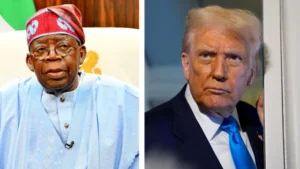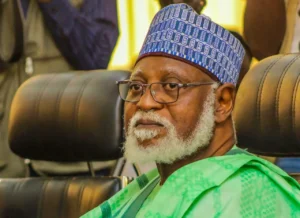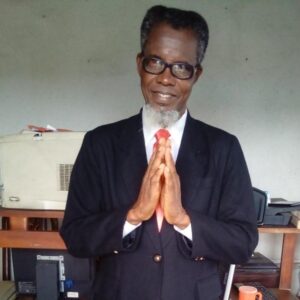NAVIGATING THE POLITICAL LANDSCAPE: PROSPECTS FOR NIGERIA’S 2027 ELECTIONS

As Nigeria approaches the 2027 presidential elections, the political climate is rife with tension, uncertainty, and the potential for significant shifts.
A spate of defections to the ruling All Progressives Congress (APC), coupled with the recent initiatives by opposition leaders to form a coalition aimed at unseating President Bola Ahmed Tinubu, raises critical questions regarding the future trajectory of Nigeria’s democratic practice.
The prevailing narratives reflect deep-rooted frustrations that could herald transformative shifts, but they also expose vulnerabilities that require caution and critical examination from the electorate.
The Current Landscape
The APC, having consolidated power since 2015, now faces growing opposition. The defections to the ruling party indicate not just loyalty or ideological alignment but also a response to a complex intersection of personal ambition and political survival.
This creates an environment where the APC’s strength might overshadow the opposition, raising alarms about the erosion of democracy and the potential emergence of a one-party state.
On the other hand, the attempts by opposition leaders to collaborate reflect an awareness of the necessity for unity among disparate factions.
However, historical precedents caution against the efficacy of coalitions formed out of necessity rather than shared visions. The inability to overcome internal contradictions often leads to fragmentation rather than consolidation.
Historical Context: Lessons from the Past
Nigeria’s political history is replete with instances where coalitions have ultimately fragmented, leading to missed opportunities for genuine change.
The Alliance for Democracy (AD), formed in the late 1990s, became a shadow of its former self after failing to maintain coherence among its members.
Similarly, the merging of several opposition parties to create the APC in 2013 highlighted the potential of unity but also the limitations inherent in such alliances, particularly when individual agendas take precedence over collective goals
Equally significant is the evolution of Nigeria’s political parties in the Second Republic (1979-1983), during which different factions emerged but struggled with ideological inconsistencies.
The fragmentation led to the dissolution of democratic governance, leading to military rule. This historical perspective underscores the imperative for the current opposition to forge valid, coherent coalitions that prioritize the electorate’s welfare over personal or factional interests.
Potential Shifts in 2027
Considering the vast political landscape and the bubbling agitations across various strata of Nigerian society—economic discontent, ethnic division, and youth engagement through social movements—it is plausible to foresee significant shifts in the political narrative come 2027.
- Youth Mobilization: The 2023 elections marked a critical moment for youth engagement, asserting their presence in the political domain. If harnessed effectively, young voters could tip the electoral balance, especially if opposition leaders manage to resonate with their aspirations.
- Impact of Internal Opposition Dynamics: The nature of the coalition being formed by opposition leaders will be pivotal. If it is characterized by genuine ideological compatibility and robust internal mechanisms to address grievances, it could pose a viable challenge to the APC. Conversely, if it falls short, the opposition risks alienating potential voters who yearn for authentic representation.
- Economic and Social Context: The economic landscape, marked by inflation, unemployment, and pervasive corruption, will heavily influence voters’ decisions. The ability of opposition parties to articulate a clear, actionable agenda that starkly contrasts with the APC’s governance record could resonate prominently with the electorate. Guarding Against Misappropriation
It is crucial for the electorate to navigate these political narratives judiciously. Here are key points to consider:
- Demand Clarity and Accountability: Voters should hold politicians accountable for their past actions and clarity in their plans for the future. Speeches and manifestos should be scrutinized for feasibility rather than abstract promises.
- Engage in Grassroots Movements: Beyond coalitions, citizens should engage with grassroots movements that promote civic education and empower local communities to question the status quo.
- Prioritize Inclusivity: The electorate must advocate for truly inclusive political participation that encompasses the diverse voices of Nigeria, particularly marginalized groups, ensuring that the future of Nigeria is shaped by a democratic ethos rather than merely party allegiance.
Conclusion
In conclusion, as Nigeria heads towards the 2027 elections, the interplay between emerging coalitions and the ruling party’s consolidation will define the political landscape.
Historical precedents should serve as a guiding light, showcasing both the possibilities and pitfalls of political alliances. For stability and growth, Nigeria requires a vigilant electorate ready to assert its rights, demand accountability, and insist on a political environment that transcends individual ambitions, promoting a truly democratic governance model.
The journey towards an improved political framework is difficult but imperative for the sustenance of Nigeria’s democracy and the well-being of its citizens.
The big question: could members of the COALITION withstand Tinubu bait political style?
Amb. Dr. Samson Joseph Iriruaga is a public affairs commentator and peace advocate.




